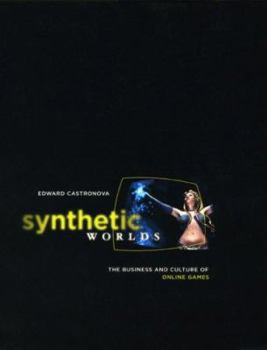Synthetic Worlds: The Business and Culture of Online Games
Select Format
Select Condition 
Book Overview
From EverQuest to World of Warcraft, online games have evolved from the exclusive domain of computer geeks into an extraordinarily lucrative staple of the entertainment industry. People of all ages and from all walks of life now spend thousands of hours-and dollars-partaking in this popular new brand of escapism. But the line between fantasy and reality is starting to blur. Players have created virtual societies with governments and...
Format:Paperback
Language:English
ISBN:0226096270
ISBN13:9780226096278
Release Date:October 2006
Publisher:University of Chicago Press
Length:344 Pages
Weight:0.35 lbs.
Dimensions:0.8" x 6.1" x 9.0"
Customer Reviews
5 ratings
The bible for designing a breathing world
Published by Thriftbooks.com User , 15 years ago
Castronova goes beyond the ideas of Virtual Reality equipment to surrender into practical virtual reality, a much more powerful and doable technology. One of the most important chapters, worth reading and reading again if you are into designing a highly interactive virtual world, is no doubt Chapter 8 (The economics of fun), where Mr. Castronova uses all of is formal economics knowledge and mixes it with the dynamics of virtual worlds, landing into a concise list of things to have in mind for your virtual world economy.
Great start on the subject
Published by Thriftbooks.com User , 17 years ago
Best book discussing online worlds that I've read. The author's background in economics makes for an interesting perspective. He goes to great lengths to point out where and how virtual worlds cross over into the "real" world. He doesn't, however, take things quite as far as I expected. For instance, he doesn't suggest that any interaction, social or otherwise, if conducted online might well be considered as having occurred in a virtual world. And he doesn't spend any effort exploring online to offline gestural equivalence. But I don't think he can be faulted. There's enough material in this area to fill several volumes. What he does cover, he makes accessible, interesting, and relevant. [...]
A Serious Economic & Sociological Analysis of Game Playing
Published by Thriftbooks.com User , 17 years ago
This book survey's the landscape of online game playing and its impact on business, law, politics, social behavior, etc. If you are looking for a comprehensive analysis, Synthetic Worlds provides a thoughtful and accessible option. Oddly, for a 300 page book, my version had a very small font size. If you suffer from eye strain, you may want to make sure the type is suitable for you.
a book by an economist has no right to be this readable!
Published by Thriftbooks.com User , 18 years ago
a fascinating look into the "big picture" of online gaming worlds. as a WoW player, it made me think a great deal about how the game is actually structured as a society, and how economics can explain this structure. The book is a bit more speculative when it verges outside of the concerns of economics into politics but this doesn't detract. Castronova's an engaging writer and not at all afflicted with "academese"
The New Face of Gaming explored inSynthetic Worlds
Published by Thriftbooks.com User , 19 years ago
I first came across DR. Castranova after reading a paper he had written on the cost variance between male and female Avatars (characters) sold on Ebay for the game "Everquest". As a recovering ex-gamer I found this material interesting. Anyone who has ever played a game that is within a synthetic world should understand exactly how engrossing they are. (A Synthetic World is a gaming landscape that is always running in which gamers can interact with each other and play within a virtual reality that has loose rules and the characters can nearly do whatever they want) Dr. Castranova's book "Synthetic Worlds" explores the new technology of role playing games set within these virtual realities and what they mean to the players and to society at large. It all started in the later 90's when the video game classic Ultima was created as "Ultima Online". From then on there have been more and increasingly complex virtual world games including "Everquest" and "World of Warcraft". Gamers who want to have good characters in these games can play for many hours and build their warriors, mages etc into powerful players OR they can buy them on Ebay. This is one way in which the game world has real world implications. But on a deeper note it seems that gamers many of whom put in many hours a day within these synthetic worlds, often seem to care more for their synthetic life than their actual one. There are several problems with this and while the majority of people can cope with the separation of synthetic and actual worlds there are a few that cannot. Either way these synthetic worlds have become a great new form of escapism that lets the user do things they could never do in a very real feeling way. Castranova further looks into the video game industry and poses the question of what happens when the gaming company cannot make money on the game any longer and wishes to "pull the plug" on the synthetic world. Obviously people would be annoyed and he suggests that possibly the game could be turned over to the players but this too poses difficulties. I found this book to be a very interesting read and as we spend more time in front of computer interfaces each day I think we can all learn something about they way we interact with technology from reading this book. Certainly reading about the gamers themselves is very enlightening and anyone interested in the way people escape will also find this an interesting read. I think anyone interested in sociology or technology will find this book worthwhile. Ted Murena





